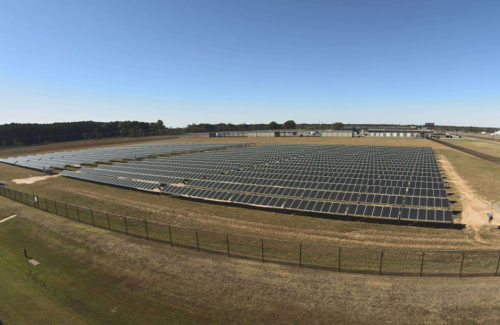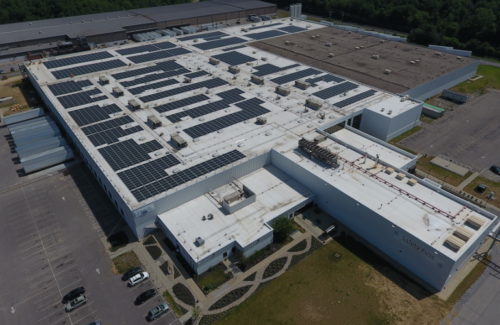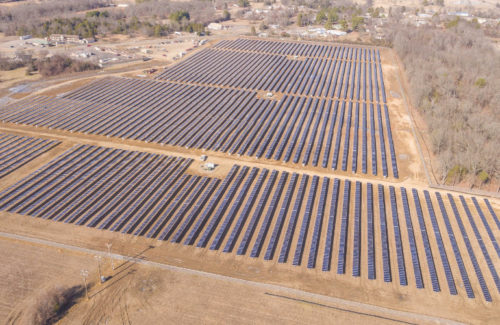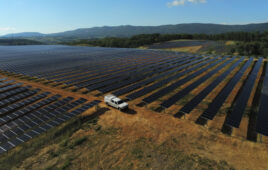Former Arkansas Lieutenant Governor Bill Halter was so impressed with the advances in solar energy during his time in government and on the boards of various technology companies that once he left office, he started a solar company in Little Rock. In 2016, Scenic Hill Solar opened as a C&I and municipal solar developer focusing on projects up to 40 MW.
“We’re very client-focused in our goals,” said Halter, now Scenic Hill’s CEO. “We want to provide not a cookie-cutter solution, but really the best possible solution for each of our clients.”
Scenic Hill started strong in 2016, developing two of the largest commercial solar arrays in Kentucky and Arkansas—both for cosmetics giant L’Oréal.
“L’Oréal has been very committed to sustainability,” Halter said. “They were different projects—one was a roof-mount, and the other was a single-axis tracking system constructed immediately adjacent to their factory. That really led to a number of other opportunities, and it’s been terrific ever since.”
The company’s focus on developing projects that meet corporate and government environmental goals has set up a good niche for Scenic Hill in the middle of the country.
“Our clients are winning awards for environmental impact, for efficiency in government as a result of the cost savings of these projects,” Halter said. “[We] work them through a set of technologies that they may not be familiar with, but together we can get them to not only have a solar power plant but also get them accomplishing their corporate or governmental goals.”
Scenic Hill Solar does its own installation work, but on larger projects, the company prefers to bid out to different EPCs. One of Arkansas’ municipal utilities, Clarksville Light and Water, recently installed a 6.5-MW tracking project, and Scenic Hill called on outside EPC help.
“This is by far the largest solar power plant in Arkansas for a municipal utility. It’s five-times larger than any previous sized power plant for municipals,” Halter said. “The municipal utility is a nonprofit entity, so we structured that transaction so that Scenic Hill and tax equity investors could monetize the federal tax incentives on behalf of the project. Then we’ll pass those benefits along in the form of a lower PPA price and also give the utility the opportunity to acquire the asset later.”
With such a long-standing special interest in renewables and public service, Halter is passionate about ensuring customers understand the benefits of solar and the role it can play in the community.
“In testimony before the Arkansas Public Service Commission and other places, I try to point out to folks that fear, uncertainty and doubt winds up killing more projects than financing,” Halter said, mentioning that the uncertainty around the solar panel tariffs slowed Scenic Hill’s planning of projects earlier this year. “If the customers and developers of the projects don’t really have clarity on the environment that they’re operating in, if there’s uncertainty that’s being created, it really does make pulling the projects off difficult.”
Market stability can be aided by state and federal policies, Halter said.
“The reality is that policies can either be encouraging of this market or they can be pretty dramatically discouraging,” he said. “So on the positive side, you’d like to see state laws that allow net metering for clients. At the federal level, the investment tax extension and the ability to apply that to storage are critical parts of the policy process. Also, we need to make sure that PURPA laws remain a robust opportunity to enhance competition and allow distributed generation to flourish. If those things begin to get shut down, it makes it very difficult for solar to compete.”
Halter has no regrets about switching careers from public office to solar power.
“[Solar] is just an extension of my interest in technology companies, but this one does bring together regulatory expertise, financing expertise in a rapidly growing market [and] the technology is advancing,” he said. “It’s a very dynamic environment. You can succeed by being more innovative and by being faster in the market. It can create some moments of riding the solarcoaster, but at the same time, it’s absolutely the wave of the future for electricity generation.”
 This month’s Contractors Corner podcast is sponsored by DuPont.
This month’s Contractors Corner podcast is sponsored by DuPont.
For over 40 years, DuPont PV materials have delivered proven performance and lasting value.







Tell Us What You Think!